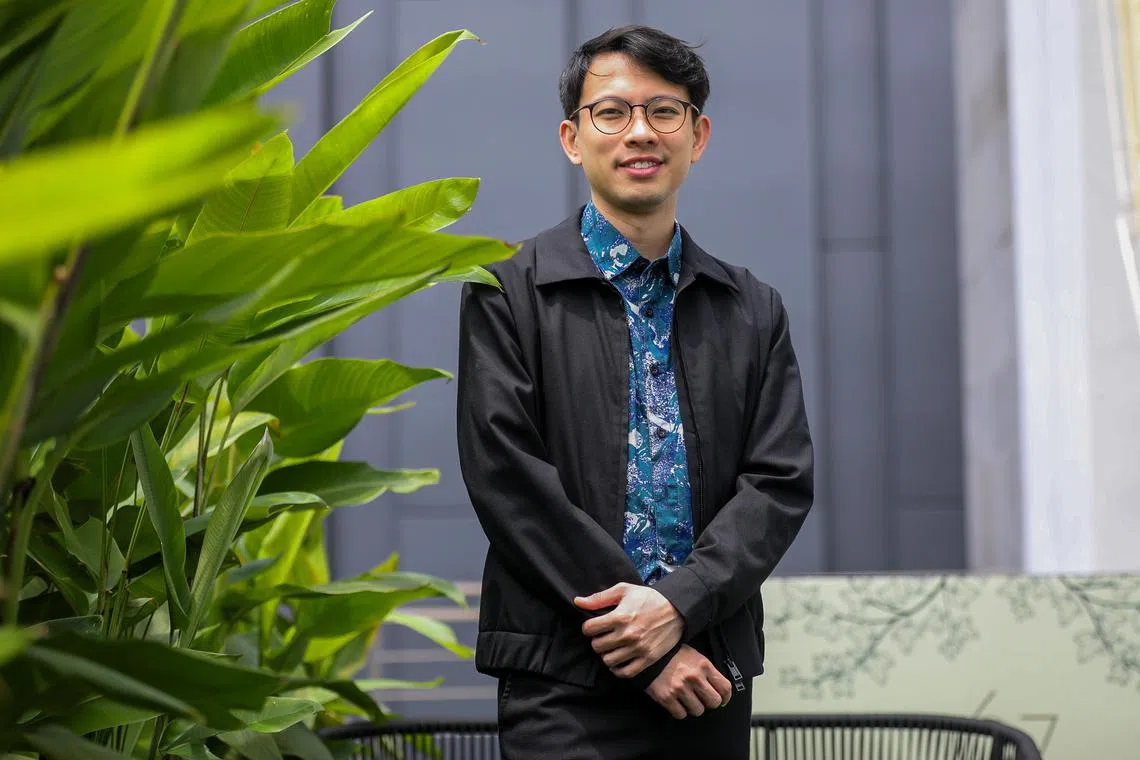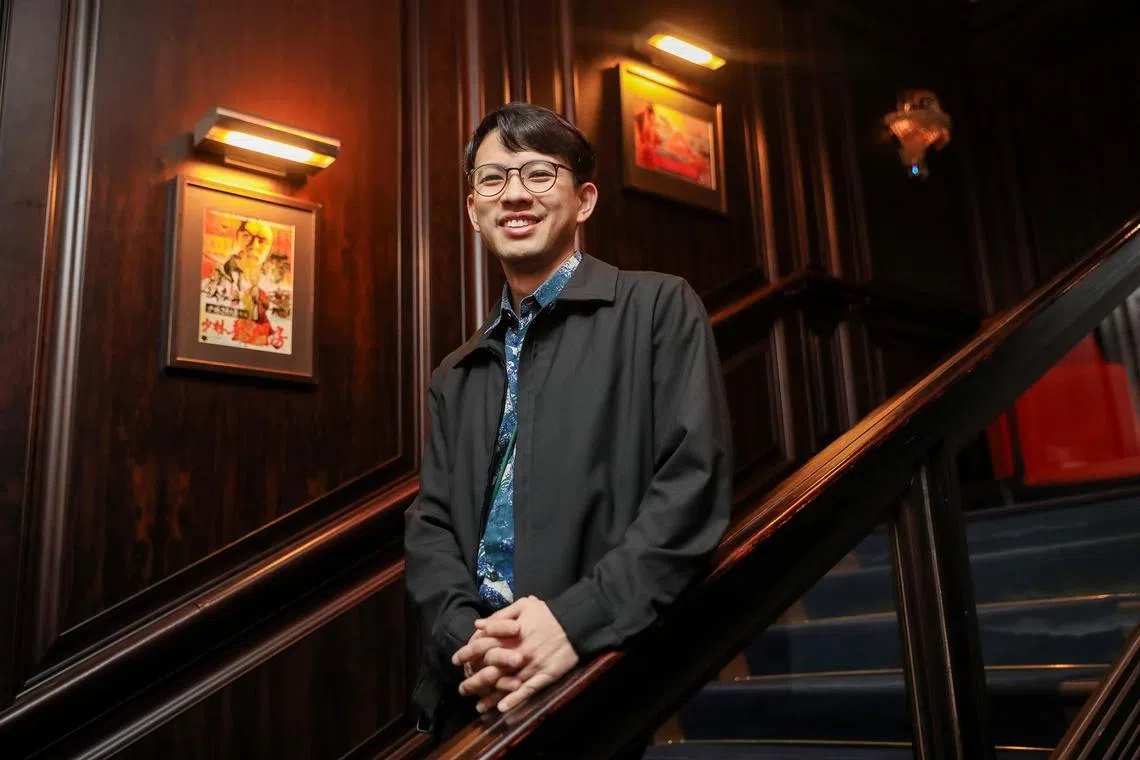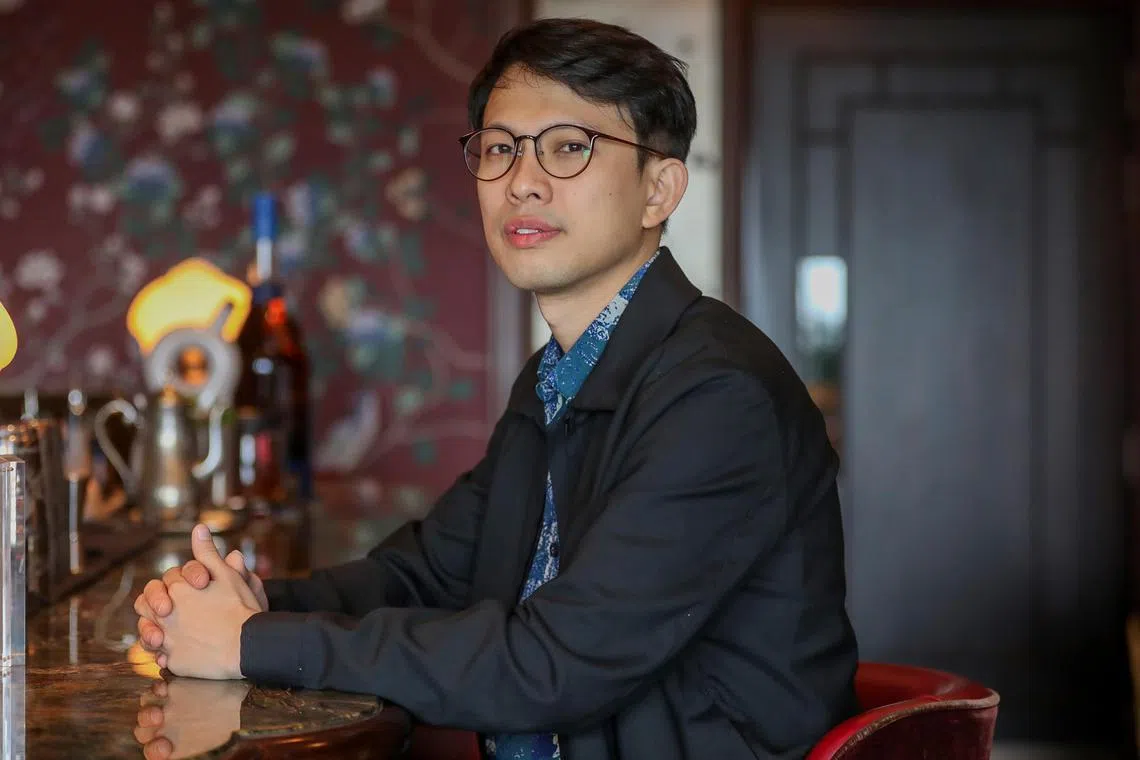Singapore International Film Festival’s new head hopes to offer an alternative to ‘junk food’
Sign up now: Get ST's newsletters delivered to your inbox

Mr Jeremy Chua, at 67 Pall Mall Singapore, has been volunteering with the festival since 2014.
ST PHOTO: LUTHER LAU
Follow topic:
SINGAPORE – The Singapore International Film Festival (SGIFF) plans to fight “junk food” viewing habits that have turned cinema into another social event, says its general manager Jeremy Chua, 36.
“People see cinema as an event – ‘let’s go watch a Marvel movie together’,” says Mr Chua, who took over leadership of SGIFF at the start of 2024.
This year’s edition of the festival runs from Nov 28 to Dec 8.
The torrent of easily digestible content from streaming services and commercial cinemas encourages a preference for unchallenging material.
“I think young people are getting more inclined to watch junk food. They will lose a sense of the philosophical, emotional and introspective space that cinema can provide.”
Mr Chua was speaking to The Straits Times recently at 67 Pall Mall Singapore, a members’ club at Shaw Centre.
Without the festival’s counterbalancing force, Mr Chua fears young people will lose touch with cinema’s power to provide experiences beyond pure entertainment.
To foster a culture of conversing about cinema, SGIFF 2024 introduced the Cinephile pass, a status that gives approved content creators free access to regular-priced screenings.
As at Nov 26, the festival has received 51 applications for the pass, of which 39 have been approved. Most are bloggers and writers for independent publications, with others being podcasters and social media influencers on platforms like YouTube.
“We have had former members of our youth critics programme, who have come back to write again. It’s mostly young people, who include students. It’s good for us to have made people interested again in the medium of writing,” he says.
“The Cinephile pass holders are free to set their editorial line and bring their personality. There’s no one teaching them to write or giving them a guide. They are there to build their sense of taste and writing style,” he says.
The output from the creators ranges from the serious and academic to the light-hearted and audience-driven.
While TikTok, YouTube Shorts and Instagram Reels have been criticised for causing attention spans to suffer, they offer a pithy, punchy alternative to traditional text-based film criticism.
“The short videos are impactful because they condense thoughts into a few words. Creators have to grab attention. Viewers are on the hook for one minute. It’s film criticism as entertainment,” he says.
Over time, he hopes that as these creators “debate online, tag one another, they create an ecosystem of dialogue and criticism”.

The Singapore International Film Festival is expanding its film education programme beyond occasional school visits into a year-round outreach effort, says general manager Jeremy Chua.
ST PHOTO: LUTHER LAU
SGIFF is expanding its film education programme beyond occasional school visits into a year-round outreach effort, particularly targeting neighbourhood schools.
“We have 12 to 15 schools in the line-up, but by next year, we’re hoping to get 25,” says Mr Chua. The festival has established a new Audience & Community Development department to run these programmes.
Schools can choose between assembly screenings and classroom sessions, with each screening including guided discussions. The programme uses relatable Singaporean and Asian short films rather than experimental works, creating what Mr Chua calls “a safe space to express their thoughts and feelings” about cinema.
He comes to the festival from the world of film producing and screenwriting. In 2014, he founded Potocol, a production house. As well as co-producing the drama A Yellow Bird (2016), he co-wrote it with director K. Rajagopal.
Mr Chua also produced films helmed by Singapore and international directors, such as Pierce (2024, now showing in cinemas), Tomorrow Is A Long Time (2023) and Autobiography (2022).
He has been volunteering with the festival since 2014, when he worked in the hospitality department, looking after the festival lounge.
Mr Chua says that so far, ticket sales have been strong. Sold-out titles include Spanish film-maker Pedro Almodovar’s portrait of female friendship The Room Next Door, starring Tilda Swinton and Julianne Moore. At the 2024 Venice International Film Festival, it won a Golden Lion, the festival’s highest award.
Also fully booked are two screenings of Chinese film-maker Lou Ye’s An Unfinished Film, a work that blends scripted scenes with documentary footage. It tells the story of a film-maker trying to shoot in China just as its government imposes a strict Covid-19 lockdown.
It won Best Narrative Feature at the 2024 Cannes Film Festival. At the just-concluded Taipei Golden Horse Awards, Lou Ye won the Best Director award. He will be in Singapore for SGIFF and his In Conversation talk is also sold out.
While no more screenings are planned for An Unfinished Film, another screening has been added for the sold-out drama The Unseen Sister, from acclaimed Taiwan-based film-maker Midi Z. It tells the story of a famous actress whose crafted facade hides secrets that threaten to disrupt her life.
On Nov 3, it was reported that Singaporean film-maker Daniel Hui’s Small Hours Of The Night, dealing with Singapore’s crackdown on communists during the 1980s, was pulled from screening at SGIFF after the authorities deemed it prejudicial to national interests.
The Infocomm Media Development Authority (IMDA) refused classification for the docu-drama, which means it cannot be screened in public or distributed.
Since the festival’s founding in 1987, films have been pulled from screening for reasons such as the explicit depictions of sex or the potential to cause enmity and social division.

Mr Jeremy Chua reiterated SGIFF’s stance on the way it curates films.
ST PHOTO: LUTHER LAU
At the 2022 edition of SGIFF, local film-maker Ken Kwek’s #LookAtMe, about a man offended by a pastor’s stance on homosexuality, was pulled after it was deemed to “denigrate a religious community”.
Mr Chua reiterated SGIFF’s stance on the way it curates films.
“It has been a principle since its founding that the festival is an independent space that does not have any agenda, apart from trying to promote what cinema can give to society in artistic inspiration,” he says.
That principle sometimes leads to films being pulled from screenings.
“We don’t self-censor our selection to make sure it is friendly towards censorship,” he says. SGIFF treats the IMDA, the body that classifies films, as “an independent organisation that vets our selection and gives classifications according to their guidelines”.
Hui will still be invited to take part in panel discussions with the industry and the public, where he can talk about his approach to film-making.
“We are not here to play a game between the authorities and the audience, or to say that the authorities are right or that the film-maker is right. We want to be the platform that gives space for the discussion,” he says.
Book it/Singapore International Film Festival
Where: Various locations, including Capitol Theatre, Filmgarde Kallang, Golden Village Bugis+, Golden Village x The Projector and Lasalle Creative Cube sgiff.com
When: Nov 28 to Dec 8, various times
Admission: $15 to $25 for screenings
Info: For schedules and other information, go to


